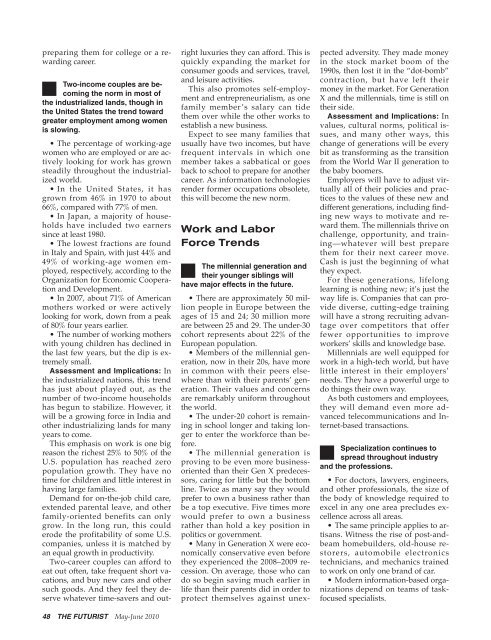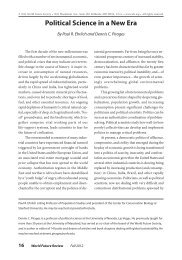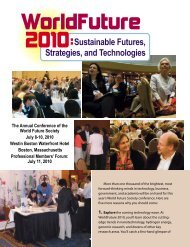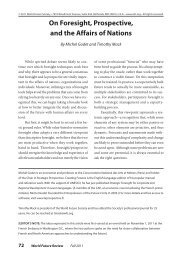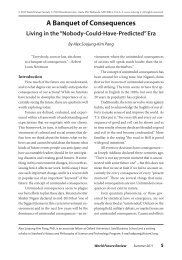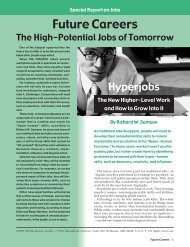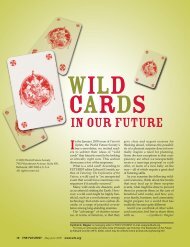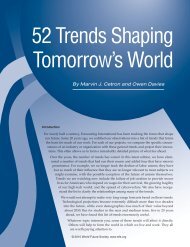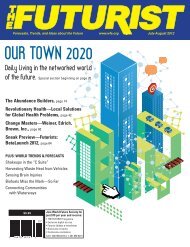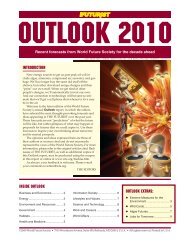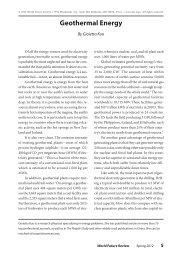Trends Shaping Tomorrow's - World Future Society
Trends Shaping Tomorrow's - World Future Society
Trends Shaping Tomorrow's - World Future Society
You also want an ePaper? Increase the reach of your titles
YUMPU automatically turns print PDFs into web optimized ePapers that Google loves.
• There are approximately 50 million<br />
people in Europe between the<br />
ages of 15 and 24; 30 million more<br />
are between 25 and 29. The under-30<br />
cohort represents about 22% of the<br />
European population.<br />
• Members of the millennial generation,<br />
now in their 20s, have more<br />
in common with their peers elsewhere<br />
than with their parents’ generation.<br />
Their values and concerns<br />
are remarkably uniform throughout<br />
the world.<br />
• The under-20 cohort is remaining<br />
in school longer and taking longer<br />
to enter the workforce than before.<br />
• The millennial generation is<br />
proving to be even more businessoriented<br />
than their Gen X predecessors,<br />
caring for little but the bottom<br />
line. Twice as many say they would<br />
prefer to own a business rather than<br />
be a top executive. Five times more<br />
would prefer to own a business<br />
rather than hold a key position in<br />
politics or government.<br />
• Many in Generation X were economically<br />
conservative even before<br />
they experienced the 2008–2009 recession.<br />
On average, those who can<br />
do so begin saving much earlier in<br />
life than their parents did in order to<br />
protect themselves against unexpreparing<br />
them for college or a rewarding<br />
career.<br />
■<br />
Two-income couples are becoming<br />
the norm in most of<br />
the industrialized lands, though in<br />
the United States the trend toward<br />
greater employment among women<br />
is slowing.<br />
• The percentage of working-age<br />
women who are employed or are actively<br />
looking for work has grown<br />
steadily throughout the industrialized<br />
world.<br />
• In the United States, it has<br />
grown from 46% in 1970 to about<br />
66%, compared with 77% of men.<br />
• In Japan, a majority of households<br />
have included two earners<br />
since at least 1980.<br />
• The lowest fractions are found<br />
in Italy and Spain, with just 44% and<br />
49% of working-age women employed,<br />
respectively, according to the<br />
Organization for Economic Cooperation<br />
and Development.<br />
• In 2007, about 71% of American<br />
mothers worked or were actively<br />
looking for work, down from a peak<br />
of 80% four years earlier.<br />
• The number of working mothers<br />
with young children has declined in<br />
the last few years, but the dip is extremely<br />
small.<br />
Assessment and Implications: In<br />
the industrialized nations, this trend<br />
has just about played out, as the<br />
number of two-income households<br />
has begun to stabilize. However, it<br />
will be a growing force in India and<br />
other industrializing lands for many<br />
years to come.<br />
This emphasis on work is one big<br />
reason the richest 25% to 50% of the<br />
U.S. population has reached zero<br />
population growth. They have no<br />
time for children and little interest in<br />
having large families.<br />
Demand for on-the-job child care,<br />
extended parental leave, and other<br />
family-oriented benefits can only<br />
grow. In the long run, this could<br />
erode the profitability of some U.S.<br />
companies, unless it is matched by<br />
an equal growth in productivity.<br />
Two-career couples can afford to<br />
eat out often, take frequent short vacations,<br />
and buy new cars and other<br />
such goods. And they feel they deserve<br />
whatever time-savers and out-<br />
48 THE FUTURIST May-June 2010<br />
right luxuries they can afford. This is<br />
quickly expanding the market for<br />
consumer goods and services, travel,<br />
and leisure activities.<br />
This also promotes self-employment<br />
and entrepreneurialism, as one<br />
family member ’s salary can tide<br />
them over while the other works to<br />
establish a new business.<br />
Expect to see many families that<br />
usually have two incomes, but have<br />
frequent intervals in which one<br />
member takes a sabbatical or goes<br />
back to school to prepare for another<br />
career. As information technologies<br />
render former occupations obsolete,<br />
this will become the new norm.<br />
Work and Labor<br />
Force <strong>Trends</strong><br />
■<br />
The millennial generation and<br />
their younger siblings will<br />
have major effects in the future.<br />
pected adversity. They made money<br />
in the stock market boom of the<br />
1990s, then lost it in the “dot-bomb”<br />
contraction, but have left their<br />
money in the market. For Generation<br />
X and the millennials, time is still on<br />
their side.<br />
Assessment and Implications: In<br />
values, cultural norms, political issues,<br />
and many other ways, this<br />
change of generations will be every<br />
bit as transforming as the transition<br />
from the <strong>World</strong> War II generation to<br />
the baby boomers.<br />
Employers will have to adjust virtually<br />
all of their policies and practices<br />
to the values of these new and<br />
different generations, including finding<br />
new ways to motivate and reward<br />
them. The millennials thrive on<br />
challenge, opportunity, and training—whatever<br />
will best prepare<br />
them for their next career move.<br />
Cash is just the beginning of what<br />
they expect.<br />
For these generations, lifelong<br />
learning is nothing new; it’s just the<br />
way life is. Companies that can provide<br />
diverse, cutting-edge training<br />
will have a strong recruiting advantage<br />
over competitors that offer<br />
fewer opportunities to improve<br />
workers’ skills and knowledge base.<br />
Millennials are well equipped for<br />
work in a high-tech world, but have<br />
little interest in their employers’<br />
needs. They have a powerful urge to<br />
do things their own way.<br />
As both customers and employees,<br />
they will demand even more advanced<br />
telecommunications and Internet-based<br />
transactions.<br />
■<br />
Specialization continues to<br />
spread throughout industry<br />
and the professions.<br />
• For doctors, lawyers, engineers,<br />
and other professionals, the size of<br />
the body of knowledge required to<br />
excel in any one area precludes excellence<br />
across all areas.<br />
• The same principle applies to artisans.<br />
Witness the rise of post-andbeam<br />
homebuilders, old-house restorers,<br />
automobile electronics<br />
technicians, and mechanics trained<br />
to work on only one brand of car.<br />
• Modern information-based organizations<br />
depend on teams of taskfocused<br />
specialists.


